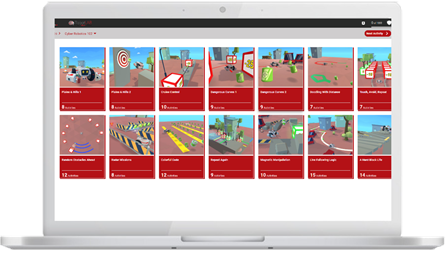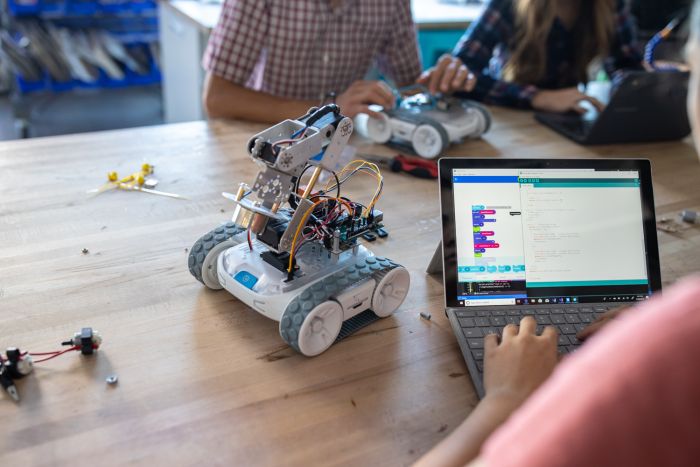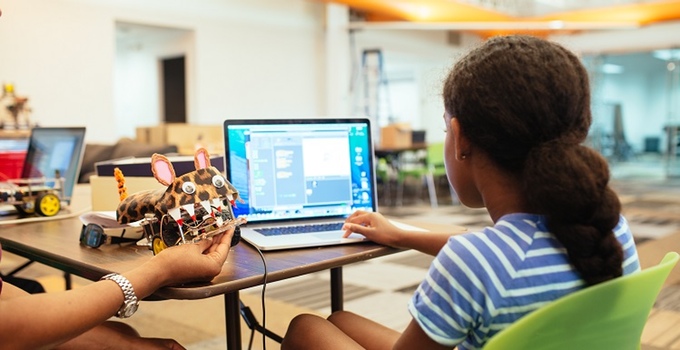RobotLAB Blog
Everything You Need To Know About Robotics in Businesses
Take a #StayAtHome virtual tour of Disneyland with these 88 movies and shows during coronavirus shutdown
From a galaxy far, far away to a whole new world, you can bring a piece of Disneyland home even if you can’t go to the Anaheim theme park during the continuing coronavirus closure.

- 0 Comments
- Apr 7, 2020 10:00:00 AM
- Posted by Natalia Galvis
- Topics: EdTech, STEM, Computer Science, Coding, Robots,, Learning, STEMchat, Edchat, teaching, coronavirus, homeschool, online
Making Your Own Education When Traditional College Isn't an Option
Let me begin by informing you that a college education is not a necessity. It’s just one of the options to choose in a long list which consists of several other great alternatives. Hence you could even strike it out from the list and you would still have choices that are good enough to ensure a comfortable life for you.

- 0 Comments
- Apr 6, 2020 10:00:00 AM
- Posted by Natalia Galvis
- Topics: EdTech, STEM, Computer Science, Coding, Robots,, Learning, STEMchat, Edchat, teaching, coronavirus, homeschool, online
7 Keys To Effective Online Learning
High-quality and engaging online learning programs have a number of common characteristics.

- 0 Comments
- Apr 3, 2020 10:00:00 AM
- Posted by Natalia Galvis
- Topics: EdTech, STEM, Computer Science, Coding, Robots,, Learning, STEMchat, Edchat, teaching, coronavirus, homeschool, online
RobotLAB is offering free online Virtual Robotics and Coding courses to those affected by COVID-19.
We know that schools are being challenged with finding ways to convert their class activity into online lessons and how to train teachers to do so, all to ensure the continuation of education for the students.
Recognizing the enormous impact this situation has on all schools, we at RobotLAB, wanted to inform you of the following unique proposal by Amazon and Engage EDU Lite (Powered by CoderZ):
Amazon Future Engineer is offering free online Virtual Robotics and Coding courses for any student or teacher affected by school closures due to COVID-19 in the US.
Students and teachers at primary schools, middle schools and high schools are invited to program their own virtual robots through the Engage EDU Lite platform.
Check it out Here

Keep learning during COVID-19 with RobotLAB and CoderZ!
CoderZ is an online educational environment that improves students 21st century skills, while they are having fun programming their own virtual cyber robot. CoderZ and RobotLAB has different lessons to do at home! Check them out Here
- 8 Comments
- Apr 2, 2020 10:00:00 AM
- Posted by Natalia Galvis
- Topics: EdTech, STEM, Computer Science, Coding, Robots,, Learning, STEMchat, Edchat, teaching, coronavirus, homeschool
Why Learning to Code Benefits Kids, Regardless of Future Career Choice

“An understanding of computer science is becoming increasingly essential in today’s world. Our national competitiveness depends upon our ability to educate our children—and that includes our girls—in this critical field.”—Sheryl Sandberg
Sheryl Sandberg, the chief operating officer of Facebook, is one of many advocates of computer science education in our country. Educators, technology experts, business leaders, and even celebrities support a new movement with a clear purpose: to teach children to read and write code.
“Coding is the new literacy. To thrive in tomorrow’s society, young people must learn to design, create and express themselves with digital technologies,” says Mitchel Resnick, a media arts and sciences professor at the MIT Media Lab.
Coding is so important because its impact extends far beyond simply creating software and websites.
- 0 Comments
- Apr 1, 2020 10:00:00 AM
- Posted by Natalia Galvis
- Topics: EdTech, STEM, Computer Science, Coding, Robots,, Learning, STEMchat, Edchat, teaching, coronavirus, homeschool
Computer Science K-12 Classrooms Needs to Catch Up

It’s estimated that in the next decade the number of computer science jobs in the U.S. will outnumber qualified people by 1 million. That’s 1 million jobs for the taking that Americans will miss out on because of inadequate skill sets. Despite this, only 10 percent of K-12 schools have computer science programs.
So what gives?
- 0 Comments
- Jan 16, 2020 10:00:00 AM
- Posted by Natalia Galvis
- Topics: Robotics, EdTech, STEM, Computer Science, Coding, Robots,, programming, Edchat
Unlocking the Code for Robotics in the Classroom
Teaching robotics to elementary students can enhance sensory learning, improve socialization, provide opportunities for hands-on innovation, and raise the level of rigor.

- 0 Comments
- Dec 17, 2019 10:10:00 AM
- Posted by Natalia Galvis
- Topics: Robotics, EdTech, Education, Computer Science, code, Coding, Edchat
What will AI and robotics mean for higher education?
The world around us is getting “smarter.” Artificial intelligence (AI), data, and natural language processing have enabled Alexa, Siri, Pandora, Netflix, Facebook, Google, Amazon, Waze, and other platforms to become part of our lives. Both AI and robotics are projected to have a massive impact on the global economy. While anticipated improvements in GDP and efficiency are positive, some fear that jobs will be lost through automation. What will AI and robotics mean for higher education? Will automation affect colleges and universities?

- 0 Comments
- Nov 27, 2019 10:30:00 AM
- Posted by Natalia Galvis
- Topics: EdTech, Education, Computer Science, Edchat, Computational thinking
Computer Science in K-12 Classrooms Needs to Catch Up
It’s estimated that in the next decade the number of computer science jobs in the U.S. will outnumber qualified people by 1 million. That’s 1 million jobs for the taking that Americans will miss out on because of inadequate skill sets. Despite this, only 10 percent of K-12 classrooms have computer science programs. So what gives?

- 0 Comments
- Nov 26, 2019 10:00:00 AM
- Posted by Natalia Galvis
- Topics: EdTech, Education, Computer Science, Edchat, Computational thinking
Why Computer Science Should Be a High School Graduation Requirement
Computing is an integral part of every aspect of our lives, from how we connect with each other to the way we do our jobs and get around. Computing is the number one source of all new wages in the U.S. economy and there are currently 500,000 open computing jobs across the country.

Yet, according to a Code.org report, only 15 states require all high schools to offer computer science. Many parents, educators, and education institutions are calling for computer science to be a high school graduation requirement. As one commentator pointed out: Schools teach math to students regardless of whether they want to become mathematicians because it is foundational. The same is true of computer science. There are a number of benefits to taking computer science in high school.
- 0 Comments
- Nov 18, 2019 10:30:00 AM
- Posted by Natalia Galvis
- Topics: EdTech, STEM, Education, Computer Science, Coding, STEMchat, Edchat, Computational thinking
Relevant Posts
- Augmented Reality: A Tool for Teaching Students Robot Programming
- Fostering Innovation Through Youth Education in STEM and EdTech
- How Parents Can Foster STEM Learning Beyond the Classroom
- How Robotics Cultivates a Deep Understanding of Mathematics in Students
- RobotLAB Receives EDTech Chronicle 2023 ‘BESTIE’ Award for Landmark Partnership with American Samoa Dept. of Education.
Subscribe to Email Updates
-
I Want To Learn MoreADDITIONAL INFORMATION
